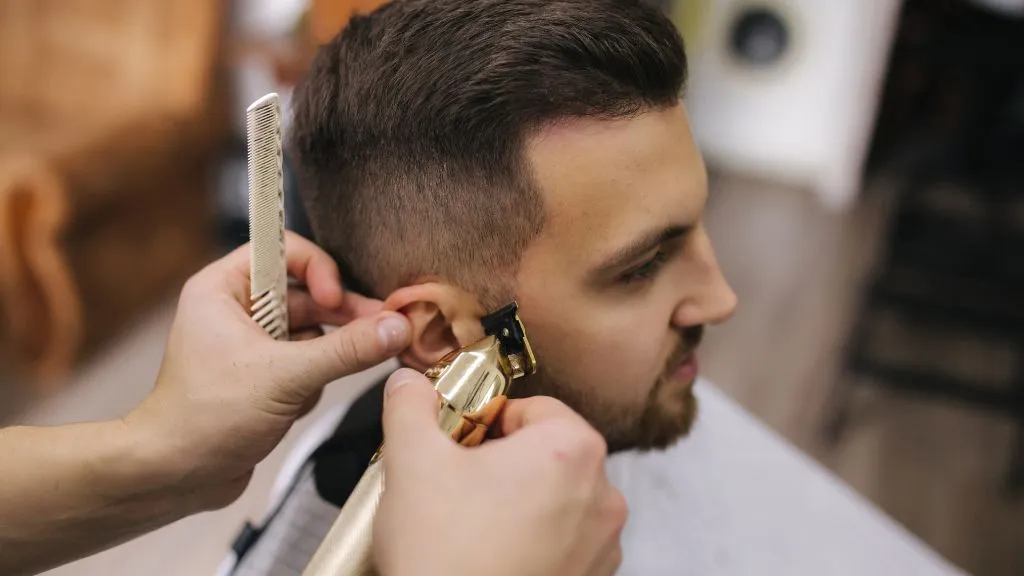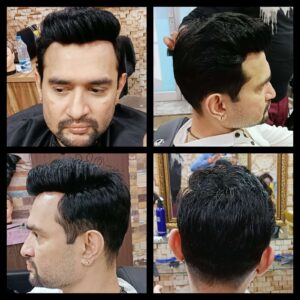If you are suffering from hair loss or baldness, you may have considered getting a hair transplant to restore your hair. However, not everyone is a good candidate for surgical hair transplant, or may not want to undergo an invasive procedure that involves risks and costs. In that case, you may be wondering if there is a non-surgical alternative that can give you similar results.
Non-surgical hair transplant is a term that refers to a variety of treatments and products that can help you improve your hair appearance without surgery. Some of these options include:
- Hair replacement systems: These are custom-made hair pieces that are attached to your scalp using adhesives or clips. They are made of natural or synthetic hair that matches your own hair color, texture, and density. They can cover any area of hair loss and create a natural-looking hairline.
- Scalp micro pigmentation: This is a cosmetic procedure that involves tattooing tiny dots on your scalp to create the illusion of hair follicles. It can be used to camouflage thinning areas, scars, or bald patches. It can also create a more defined hairline or add density to existing hair.
- Low-level laser therapy: This is a treatment that uses low-level light energy to stimulate blood circulation and cellular activity in your scalp. It can help prevent further hair loss and promote hair growth by enhancing the health of your hair follicles.
- Platelet-rich plasma therapy: This is a treatment that involves injecting your own blood plasma enriched with platelets and growth factors into your scalp. It can help repair damaged tissue and stimulate hair growth by activating your stem cells and healing factors.
- Medications: There are some FDA-approved medications that can help treat hair loss by targeting the hormonal or inflammatory causes of it. These include minoxidil, which is a topical solution that can increase blood flow and nutrient delivery to your scalp, and finasteride, which is an oral pill that can block the production of DHT, a hormone that shrinks your hair follicles.
All these non-surgical hair transplant options have their own advantages and disadvantages, depending on your preferences, budget, and expectations. However, one thing they have in common is that they are not permanent solutions.
Unlike surgical hair transplant, which involves moving your own healthy hair follicles from one area of your scalp to another, non-surgical hair transplant does not change the root cause of your hair loss. Therefore, you may need to repeat or maintain these treatments regularly to keep up with the results.
For example, hair replacement systems need to be replaced every few months as they wear out or lose their quality. Scalp micro pigmentation may fade over time and require touch-ups every few years. Low-level laser therapy and platelet-rich plasma therapy may require multiple sessions and ongoing maintenance to see optimal results. Medications may lose their effectiveness over time or cause side effects.
Therefore, if you are looking for a permanent solution for your hair loss, a non-surgical hair transplant may not be the best option for you. However, if you are looking for a temporary or complementary solution that can improve your appearance and confidence without surgery, a non-surgical hair transplant may be worth considering.
If you are interested in learning more about non-surgical hair transplant options, you can visit our website Indian Hair World and book a free consultation with our experts. We will assess your condition and recommend the best treatment for you based on your goals and needs.
Don’t let hair loss affect your self-esteem and happiness. Contact us today and discover how we can help you achieve the best version of yourself with a non-surgical hair transplant.
Frequently Asked Questions
What is the difference between surgical and non-surgical hair transplant?
Surgical hair transplant is a procedure that involves removing healthy hair follicles from one area of your scalp and transplanting them to the areas where you have hair loss. Non-surgical hair transplant is a term that refers to a variety of treatments and products that can help you improve your hair appearance without surgery, such as hair replacement systems, scalp micropigmentation, low-level laser therapy, platelet-rich plasma therapy, and medications.
How much does non-surgical hair transplant cost in Kolkata?
The cost of non-surgical hair transplant in Kolkata depends on the type of treatment or product you choose, the extent of your hair loss, and the quality of the service or product. Generally, non-surgical hair transplant is cheaper than surgical hair transplant, but it may require more frequent maintenance or replacement. To get an accurate estimate of the cost of non-surgical hair transplant in Kolkata, you can contact us for a free consultation.
How long does non-surgical hair transplant last?
Non-surgical hair transplant is not a permanent solution for your hair loss. Depending on the type of treatment or product you choose, you may need to repeat or maintain it every few months or years to keep up with the results. For example, hair replacement systems need to be replaced every few months as they wear out or lose their quality. Scalp micropigmentation may fade over time and require touch-ups every few years. Low-level laser therapy and platelet-rich plasma therapy may require multiple sessions and ongoing maintenance to see optimal results. Medications may lose their effectiveness over time or cause side effects.
What are the benefits of non-surgical hair transplant?
Non-surgical hair transplant has some benefits over surgical hair transplant, such as: It does not involve anesthesia, surgery, or downtime. It has fewer risks and side effects. It can provide immediate results. It can be customized to suit your preferences and needs. It can be used in combination with other treatments or products. Non-surgical hair transplant can help you improve your appearance and confidence without surgery.
What are the drawbacks of non-surgical hair transplant?
Non-surgical hair transplant also has some drawbacks, such as: It does not change the root cause of your hair loss. It is not a permanent solution for your hair loss. It may require regular maintenance or replacement. It may not look as natural or realistic as surgical hair transplant. It may not work for advanced or extreme hair loss. Non-surgical hair transplant may not be the best option for everyone.







